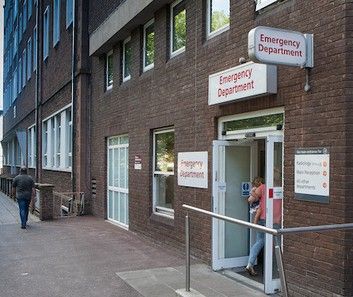
An inquest into the death of a 41 year-old prisoner, who died at the hospital while on remand at La Moye, has heard that doctors are unable to say exactly how he died.
Simon Baudains, owner of Baudains Brothers Professional Relocation Services, had been taken to hospital on 4 December 2016 to see a psychiatrist after he appeared confused and acted strangely while in prison.
Mr Baudains had been on remand following his arrest on 29 November 2016 on suspicion of committing drugs related offences. Following his arrest, he had been seen by a forensic medical examiner who said he was fit for detention and noted he was taking hydrocodeine for pain in his knee, and using an inhaler for his asthma.
While he had an history of drug and alcohol abuse, he denied taking any recreational or non-prescribed drugs before his arrest.
The day before his death, he appeared to be his usual self. His girlfriend who visited him said he was only nervous about her reaction towards, "...what he had done."
His cellmate said they played pool during the afternoon, and watched television together in the evening. He noted that although Mr Baudains was shaky during the day, he wasn't concerned about his health.
Mr Baudain's cellmate woke up around 02:30 on 4 December to banging noises as Mr Baudains was banging a cup on a counter. His cellmate tried to calm him down by making a cup of tea, and rolling a cigarette, but soon Mr Baudains started packing his belongings. When his cellmate explained that they couldn't get out, he said Mr Baudains wasn't aggressive and appeared to understand.
When the cell door was opened, he alerted prison officers. A healthcare officer at La Moye said Mr Baudains was agitated and that he could have been experiencing alcohol withdrawal or suffering from substance abuse. After speaking to the community psychiatric nurse, it was decided that Mr Baudains would go to A & E to see Dr Dale Harrison, the forensic psychiatrist who usually attends La Moye, as he was unable to make it to the prison that day.

Pictured: Mr Baudains was taken to A & E on 4 December 2016 to see a psychiatrist after his cellmate reported he had been acting strangely.
Both prison officers who escorted Mr Baudains said he was acting erratically and appeared delusional. He was quite talkative but would come up with random things in the middle of the conversation. One of the officers, who knew him through his removal business, noted: "One minute he would be having a normal conversation and the next he would go off on a tangent and say random things. At one point he said he could see a cat walking through the ward. (...) The Simon I saw that day wasn't the Simon I knew. He was completely out of character."
Mr Baudains arrived at the A & E department at 12:15 and was seen by a triage nurse shortly after.
The inquest heard that around 13:50, as Mr Baudains was waiting to see the doctor, he suddenly went quiet. Both prison officers noticed that he was staring blankly to the corner of the room. They both tried talking to him but got no reply. Mr Baudains then started shaking and the officers put him down on the floor in the recovery position and called for help.
Medical staff made attempts to resuscitate him for 20 minutes, but they were unsuccessful.
Dr Russell Delaney, a Home Office Registered Forensic Pathologist, carried out a post-mortem examination on Mr Baudains but was unable to identify a cause of death.
There was no sign of external or internal injury that could have caused or contributed to his death. A neuropathologist who analysed Mr Baudains' brain said there was no evidence of injury or any abnormality. His heart was slightly enlarged and there was evidence of coronary disease, but Dr Delaney said it didn't explain the seizure.
No traces of drugs, including designer drugs and synthetic cannabinoids, were found in Mr Baudain's blood or urine. Dr Delaney, however, noted that newer drugs can be hard to detect.
He said he had been unable to identify a definite cause of death but put forward two theories: the possibility that Mr Baudains ingested something that couldn't be or wasn't detected, which he said was unlikely, but couldn't be ruled out; and a seizure caused by the withdrawal of diazepam, which Mr Baudains had refused to take the day before he died.
Mr Baudains' girlfriend of six years said he was a lovely man with a big heart, "loud, funny and confident, loving and kind" and a good dad to his daughters. His mum said they always had a good relationship and that he always made sure to call her weekly.
His cellmate said he was very friendly, with a bubbly personality and was very easy to get on with. He added that although Mr Baudains had just been arrested, he was definitely looking to the future and "was looking forward to getting stuck in with the opportunities at the prison."
He described him as positive and determined to make the best of his time in prison and said he had filled a number of applications for work and courses with the prison listener. He was also trying to sort out his business to make sure he could resume upon his release.
The Deputy Viscount, Advocate Mark Harris, who was acting as coroner for the Inquest, concluded that Mr Baudains' cause of death was unascertained as no natural diseases had been identified. He noted that some theories had been suggested, one of them being a possible ingestion of illicit substance but that there was no evidence to support it.
Comments
Comments on this story express the views of the commentator only, not Bailiwick Publishing. We are unable to guarantee the accuracy of any of those comments.